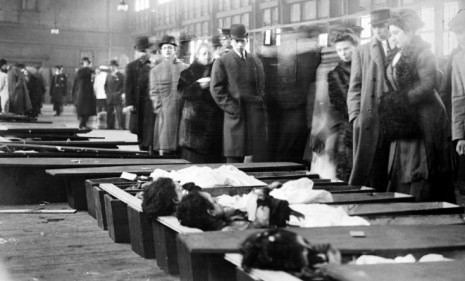The forgotten lessons of the Triangle Shirtwaist fire
On the centennial of the landmark workplace tragedy, The Nation's Joshua Freeman looks back on the reform it inspired... and how those changes have since unraveled

A free daily email with the biggest news stories of the day – and the best features from TheWeek.com
You are now subscribed
Your newsletter sign-up was successful
Friday marks the 100th anniversary of the Triangle Shirtwaist fire, a tragedy that killed 146 garment workers, many of them young, immigrant women. Some even leapt to their deaths rather than burn alive in the factory they were trapped in (the exit door was locked). The fire incited nationwide debate on workplace safety and labor laws, and, eventually, spurred reform. In The Nation, Joshua Freeman laments that progressive attitudes shaped by the Triangle tragedy have since receded. "The unionization and reform that followed Triangle provides a feel-good element to an otherwise bleak story and accounts for some of its telling and retelling," he says. "Yet the triumphs — as remarkable as they were — proved limited in scope and durability." Here, an excerpt:
Today, the labor movement and progressives fight one dispiriting battle after another to defend wages, benefits, social programs and government protections from further dismemberment. Even the thrilling mobilization of labor and its allies in Wisconsin, Ohio and Indiana has remained, so far, defensive — necessary, but not enough even to win incremental advances. We live in a society that simply does not function for an ever-growing part of the population. It is too late to rally around restoring the status quo ante, an impossible and not particularly attractive ideal. Rather, like the social forces fused together by the flames at Triangle, we need to imagine a new way of being, a new set of customs and laws designed for our world of commoditization, financialization and globalization, which has brought so much wealth and so much misery — some new combination of regulation and self-organization. Only by recapturing the spirit of the reformers of a century ago, that the world belongs to us, to make right as we see fit, can we achieve even modest improvements in our daily reality.
Read the entire piece in The Nation.
The Week
Escape your echo chamber. Get the facts behind the news, plus analysis from multiple perspectives.

Sign up for The Week's Free Newsletters
From our morning news briefing to a weekly Good News Newsletter, get the best of The Week delivered directly to your inbox.
From our morning news briefing to a weekly Good News Newsletter, get the best of The Week delivered directly to your inbox.
A free daily email with the biggest news stories of the day – and the best features from TheWeek.com
-
 Nordic combined: the Winter Olympics sport that bars women
Nordic combined: the Winter Olympics sport that bars womenIn The Spotlight Female athletes excluded from participation in demanding double-discipline events at Milano-Cortina
-
 Samurai: a ‘blockbuster’ display of Japanese heritage
Samurai: a ‘blockbuster’ display of Japanese heritageThe Week Recommends British Museum show offers a ‘scintillating journey’ through ‘a world of gore, power and artistic beauty’
-
 BMW iX3: a ‘revolution’ for the German car brand
BMW iX3: a ‘revolution’ for the German car brandThe Week Recommends The electric SUV promises a ‘great balance between ride comfort and driving fun’